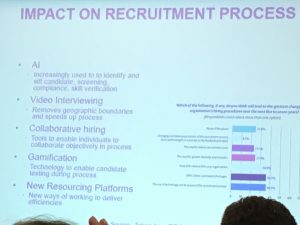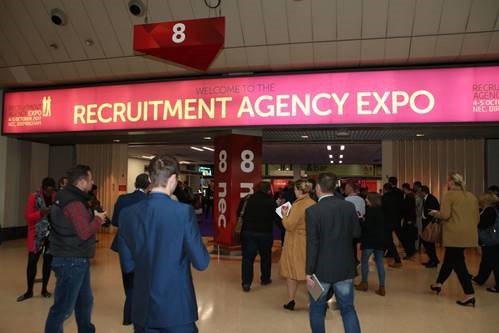We all know artificial intelligence is coming – and it is going to affect the way your business performs. Whether it is within your own company such as using AI for candidate sourcing, within your clients’ business with robots replacing people in manufacturing, or machine learning replacing repetitive customer service tasks.
At the recent Recruitment Expo in London, AI and machine learning were the hot topics at many of the seminars that I attended. Recruiters and staffing companies need to act now and start aligning their business models to the way the market is going to look in a few years’ time.

Is your niche at risk?
It was mentioned that 30% of UK jobs will be at risk, mainly those that are predictable or manual such as product assembly or data collection. Jobs at a low risk are those that require a higher level of human interaction, or where critical thinking needs to take place such as managing people, education and sales. AI still currently finds it difficult to hold conflicting arguments and apply persuasion in terms of language and intonation. But I’m sure that will change in time.
Therefore, recruiters will need to concentrate on low risk verticals and those which are brand new, created from these advances in technology, e.g. engineering or machine maintenance. It will be more difficult to differentiate yourself if you are a broad role/industry recruiter unless you have a secure brand. Yes – high volume recruiters can take advantage of Artificial Intelligence, but they need to understand that the contractor experience will become more important to candidates, so this may be more difficult to offer.
Google jobs – friend or foe?
Part of the technology invasion is the new capability of a tool that many people already use daily. Google is the preferred search engine of most people. Did you know approximately a fifth of all global advertising goes through Google search? Google is now releasing a job comparison search facility, allowing the candidate to refine the jobs they are looking for. The ‘candidate to ultimate recruiter’ can be a long and confusing journey. With Google Jobs, a candidate is provided a relevant list without needing to go through several job boards and manually search for their next step in their career path.
So what is the risk to recruitment agencies? Well, it can cut out a lot of value that recruiters currently offer. Google Jobs will be able to read CVs and pick out all relevant information, not only education and history, but where the candidate lives, where they travel (using Google Maps) and other important information derived from their own Google search history.
How to overcome the invasion
Recruitment companies need to adapt. As with all risks to the status quo, there is an opportunity to take advantage of your strengths, improve, and promote them. So if candidates are now being sent directly to your website, then make it very clear why they should stay there and apply. Instead of rows and rows of text to read, why not embed a video to keep them on your site. Original content needs to be available exclusively on your website, and social media can then help to promote it.
Be clever and set yourself apart from the others by adding more emotion to the job spec such as referring to a company review site such as Glassdoor. What is it like working there? Would I fit in? How near is it to the local transport networks or schools? The candidate experience will denote the popularity of your company and the strength of your brand in the future. Look after your candidates throughout their recruitment journey with you and beyond.

There were so many sessions to attend at RecExpo and so many suppliers to speak with. I think it’s high time Agency Time was there as an offering for the industry. So watch this space and hope to meet you at the next one!
By Karen Moore

